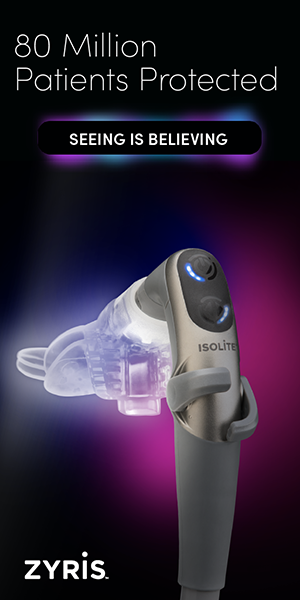Chief dental officer at MetLife explains how stress can affect dental patients and workers, and the important role dental benefits play in improved health and productivity.
By Stan Goff, Senior Managing Editor
Sure, an employee with pain in his mouth is going to want dental insurance to help alleviate that pain. But have you really ever given a lot of thought to the role a dental insurance provider plays in a person’s stress, and how that pain in the mouth may be linked to stress?
Dr. Peter Fuentes, DMD, chief dental officer at MetLife, has spent plenty a day thinking about how stress affects dental patients and workers, and his team at MetLife studies how stress can decrease work productivity and lead to tooth grinding and more serious oral health issues, not to mention how poor health is proven to lead to serious overall health problems such as diabetes, heart problems and stroke.
Dr. Fuentes, who practiced dentistry for 15 years and whose wife is a dentist, has witnessed more than his share of cases where stress has led to a patient suffering headaches, bruxism, or even a lost filling. That is why as chief dental officer at MetLife he knows just how important it is to be aware of how stress may be harming patients and why it is important for employers to be aware of the many benefits provided by having happy patients with healthy mouths.
“I spent 15 years on the other side, in dental practice treating patients and my wife still practices today. So, I have a focus group of one at all times to tell me what’s going on out there.” Dr. Fuentes said. “But patients are always really good generally about discussing things like acute pain, acute problems, a broken tooth or the loss of filling. That’s what they come in for. What’s more difficult sometimes are more chronic concerns that they assume are not dental related [including stress].”

The most common complaint he would hear from patients was that they got headaches all the time. These patients didn’t realize that headaches are a common symptom of clenching and grinding your teeth.
“As a provider, I would always sit down and ask, ‘Hey, has your job become more stressful lately? Is there anything at home that’s caused more stress, and when did the headaches start?” he said.
Often these patients who shared stories about stress would have cracked fillings or recently worn down teeth. Dr. Fuentes would notice all the hallmarks of clenching and explain to the patients that what is happening is really a dental concern, these headaches they assumed were just headaches, were brought on by stress and teeth grinding.
“I think in the industry, especially for providers, it’s important being able to have those talks and really sit down with patients and sometimes pull some more out of them,” he added. “Talk about those sort of sub-acute concerns that they deal with day to day, and clenching is like the perfect one, because you don’t know when it starts, when it happens, and they don’t even know they’re doing it.”
Dr. Fuentes adds that the COVID pandemic was a major contributor to stress for a lot of people. Clinicians have become a little better prepared to identify the signs of how stress adversely affects oral health, which in turn can lead to more serious overall health problems.
“A lot of times we go back to those acute concerns, like a cracked tooth. That’s unusual. Often it’s because you’re grinding, or you might even see things like a patient saying ‘Oh, I don’t chew on that side of my mouth.’ Something’s going on, and then you look and see it, because they grinded that side down,” he said.
“I think grinding is a great example. And oftentimes it’s very likely stress induced, especially, you know, post COVID. We saw a lot more than we ever had before. People were worried just with the uncertainty about their jobs or health or other things. Sometimes it’s just the anxiety of having to go to a dentist. They started grinding because they had a dental appointment coming up.”
Because stress can lead to many problems, not just poor dental health, MetLife is always looking at ways to provide better coverage for workers and in turn, help alleviate some of the stress-related problems dental patients and workers face today.
MetLife has an annual report called Employee Benefit Trends Study. The findings indicate just how important dental insurance is to many workers.
Key insights from the study specific to dental insurance/benefits include:
- MetLife’s 2025 Employee Benefit Trends Studyfinds that employers who offer dental benefits see positive impacts for their employees:
- 75% of employees with dental insurance report being productive at work (9% more likely than those without)
- Having employer-provided dental insurance means an employee is 17% more likely to plan on staying at their employer in the next 12 months.
- Employees with dental insurance are 13% more likely to say they are engaged at work
- The research also shows dental insurance helps with employees’ financial wellness:
- When employees have dental, they are 15% more likely to feel financially healthy
- 57% of employees with dental say they feel in control of their finances, compared to 51% of those who don’t have dental
- Employees with dental insurance are 1.2x more likely to feel holistically healthy, compared to those who don’t have dental
“One of the takeaways we see year after year is that employees are more engaged and feel more appreciated if they have benefits, and specifically dental benefits,” Dr. Fuentes explained. “And a step further, employees who utilize those benefits tend to remain employed. They feel valued. So, we have a role in making sure that we’re supplying not only benefits, but modern and valuable benefits, benefits that actually work and work the way that employee wants them to, they utilize those benefits and they’re happy with those benefits. They tend to be happier employees in the workspace.”
Years ago, many workers and employers may have considered dental insurance a luxury. But this has changed and in a big way, a way that is helping many employees maintain better oral health and in turn better overall health. More of today’s workers expect dental coverage and more people are aware of the oral-systemic health links. The increased awareness of serious health concerns being tied to periodontal disease means more people are taking steps to ensure improved oral health.
“The next generation that’s now entering the workforce, it is probably the first generation that’s had dental coverage since birth.” Dr. Fuentes said. “They had [coverage] 25-30 years ago. They were born with all the benefits and to now turn 24, 25, 26 and entering the workforce, it’s not a luxury. It’s a necessity. The big changes that employers are going to have, by and large, is to identify that these are really important benefits to make their employer workforce feel appreciative and engaged.”
The good news for patients and clinicians is that the importance of good oral health has led to big strides in recent years and it all ties together with increased awareness of the need for good mental health. Less stress can lead to happier people, which can lead to healthier mouths, which we now know can have a great impact on overall health.
“As providers, we get the messaging out through newsletters and communications, but oftentimes through the employer,” Dr. Fuentes said. “Being able to have that collaborative messaging out, especially during enrollment periods, to say you have these extra benefits that may be available. I think really, that’s where the industry is going to.
“We talk about value care is having more personalized care, dentistry shouldn’t be a one size fits all. It shouldn’t be just every six months, that’s it, and that’s where that medical piece goes into it. If you’re diabetic, if you have underlying conditions, if you’re going through radiation, you probably are much higher risk, and as a result, should have slightly different preventative needs.”
MetLife is well aware of the benefits that preventive dental care provides in terms of health and finances for employers, employees and insurance providers.
That’s why MetLife’s SpotLite program looks to shift the focus from reactive care to proactive. For more on this topic, click here to read: MetLife’s SpotLite Program Focuses on Preventive Dental Care.





